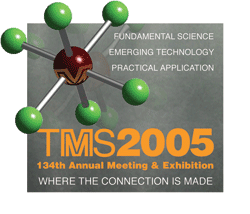|
|
FEBRUARY 13-17 · 2005 TMS ANNUAL MEETING · SAN FRANCISCO, CALIFORNIA
 The Materials Science and
Engineering, Industrial
Applications, and Processing
of Magnesium Products The Materials Science and
Engineering, Industrial
Applications, and Processing
of Magnesium Products
Sponsored by: TMS Light Metals Division
Dates and Times:
Saturday, February 12, 2005 ~ 8:30 am-5:00 pm
Sunday, February 13, 2005 ~ 8:30 am - 5:30 pm
Advance Fees: Members $645; Non-Members $735. If you register by January 17, 2005 you will save an additional $50.00.
To register for a course, please use the 2005 TMS Annual Meeting Registration form. You may register any time prior to the Annual Meeting and on-site. Course size is limited and a sufficient number of pre-registered attendees are necessary to offer each course, so please register early!
Who Should Attend
This two-day course is intended for materials scientists,
professors/students, engineers/technicians,
managers and others who wish to gain an in-depth
understanding on the materials science
and engineering of magnesium, including
the manufacturing, applications and issues
with magnesium products. Attendees will
get a full exposure to the valuable functional
attributes of this lightest of industrial
metals, including where magnesium is
used and where it might be employed in
future industrial applications. The course
will conclude with a detailed analysis of
global magnesium R&D efforts. Attendees
will be encouraged to interact with the speakers in an
open forum on issues which influence the “magnesium
industry” including how magnesium technology could
be a fruitful area for a future career.
Course
Overview
Magnesium has recently emerged from obscurity as a
reactive metal to become part of the suite of light material
choices for modern industry. Currently, magnesium
is used in automotive components (~ 5 kg/vehicle), IT
products (1/3 of all laptops, many camera, cell phones
and PDA bodies),
and hand held
home and industrial
equipment.
Magnesium science,
engineering
and processing
technology have
been extensively
studied in Europe
for over 10 years. But there is limited
exposure in North American colleges and universities.
The course will cover the basic elements of the science,
engineering, and technology including the physical, mechanical, chemical, and metallurgical properties of
magnesium and its alloys and will conclude with a detailed
analysis of current magnesium research activities
in North America, Europe, Japan, Australia, and China.
This analysis will include the major efforts to improve
the high temperature mechanical properties of cast and
worked magnesium alloys, and the extensive efforts to
produce sheet, stampings, and extrusions.
About the Presenters
Gerald
Cole PhD, FASM received his PhD from
the University of Toronto. He retired in 2001 after 35
years with Ford Motor Company supervising R&D in
metallurgy, metal casting and NDT, working on vehicle
weight reduction with cast magnesium and aluminum
and consulting on quality, productivity, supply and
product-process issues for automotive components’ producers throughout Ford’s
supply chain. He has published over 130 papers, has patented
9 innovative solutions in producing and using light metal castings,
has presented hundreds of seminars around the world, has
taught graduate-level manufacturing and engineering
science courses in US, France, Mexico, Australia, and
Israel and has organized global training seminars and
technical programs. Dr. Cole now manages his own
consulting company, LightWeightStrategies LLC.
David
St. John is currently CEO of one of the world’s
dominant light metal research and engineering centers,
the Cooperative Research Centre for Cast Metals Manufacturing
(CAST) located in Brisbane, Queensland,
Australia. CAST has 18 industry and research provider
participants and is focused on light metals research for
companies that span metal producers, their equipment
suppliers, die casters, Tier 1 suppliers and automotive
companies. CAST also delivers education and training
at high school, vocational, undergraduate, and postgraduate
levels. David has published over 200 papers,
is a co-inventor on three patents, and has a career covering
academia and industry including managing industry
research and development teams and teaching
undergraduate and industry short courses. His work in
solidification, and alloy design and heat treatment of
aluminum and magnesium alloys is extensively cited.
David can be contacted at cast@cast.crc.org.au.
For
More Information
Christina Raabe
TMS, Manager of Continuing Ed and Information
184 Thorn Hill Road
Warrendale PA 15086 USA
Tel (724) 776-9000 ext. 212
Fax (724) 776-3770
E-mail raabe@tms.org
|

